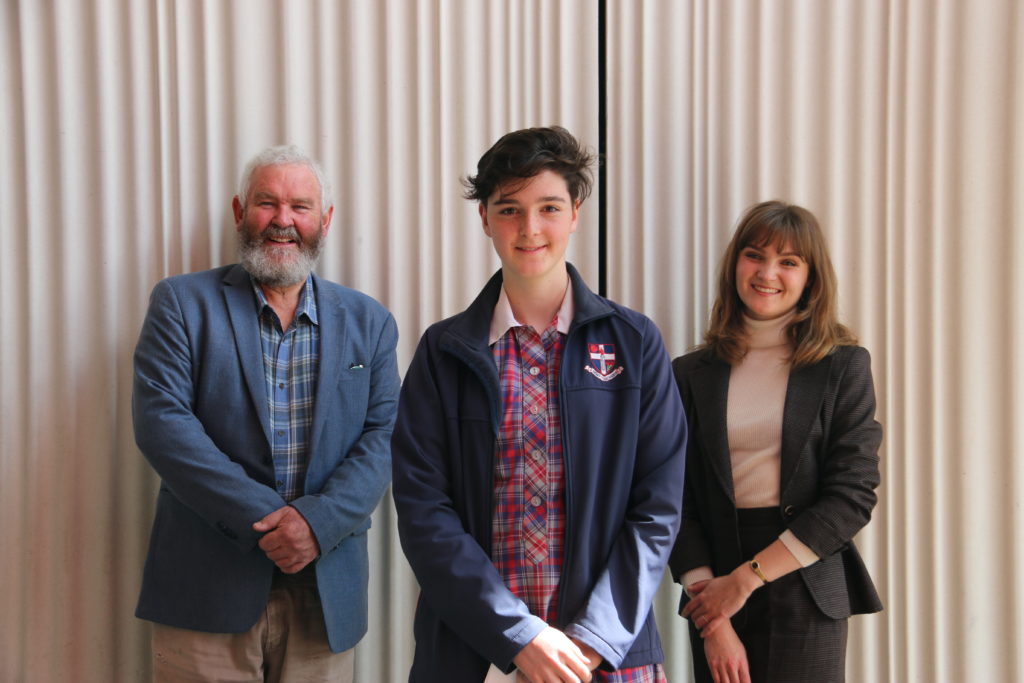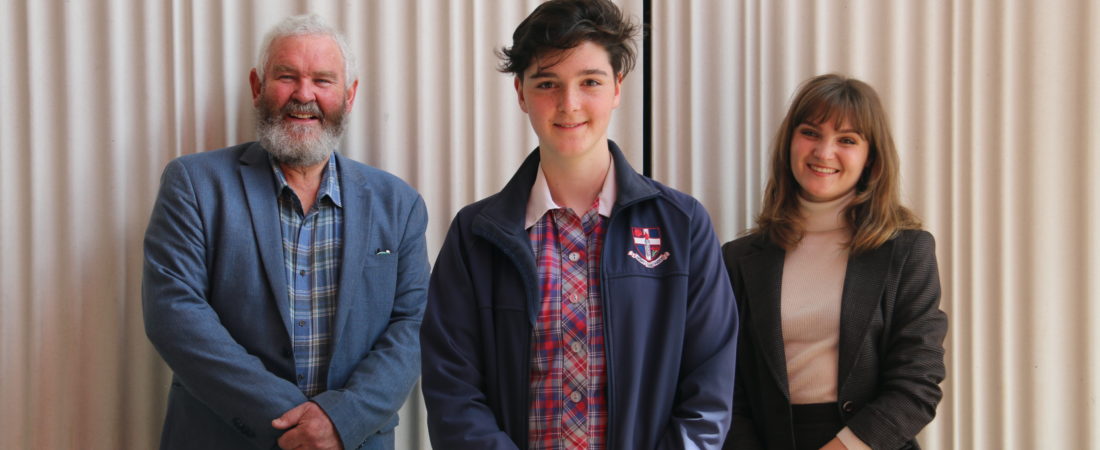Jean Yeates Writing Prize
Posted on October 16, 2020
Jean Yeates was a long-serving staff member with a passion for the English language and a devotion to education. She was considered an inspirational mentor who changed the lives of many students over her 30 years service at The Friends’ School. Her passion for teaching and strict adherence to dress and decorum standards, along with her lively hockey coaching and her regular addresses to the boarding girls earned her legendary status at The Friends’ School. Jean Yeates is remembered at the School through the Year 11/12 Jean Yeates Writing Prize and also the Jean Yeates Service to Sport Award.
This year’s Jean Yeates Writing Prize engaged with the theme of ‘The Mask’. The winning entry, a short story entitled “Terror” by Year 11 student, Nyah Inglis, approached the theme symbolically through the persona of an Afghani asylum seeker. Preceding Old Scholar Mark Nicholson’s presentation to the Prize Winner at the final Clemes Assembly, this year’s Write -in-Residence, Sam George-Allen spoke about the importance of writing by instilling a sense of the value of Art and Stories to our humanity, and encouraged students to continue telling each other stories as they moved out into the world. We congratulate Nyah Inglis on her achievement which will be recognised on the Jean Yeates honour board at Clemes.

You can read the winning entry, Terror by Nyah Inglis here:
Terror | By Nyah Inglis
Masooma’s feet didn’t move. Water sucked in the hollow between wharf and hull. The boat knocked against the concrete, its faded green fenders grinding at the wharf. The gangway lay in front of her, a bright yellow tightrope with its modern arch design and steel handrails. Eyebrows rose. One breath, two. She laced the rail with her fingertips, feeling the chill of the silver surface, slick with seaspray, tasting the salted storm. Just one step, but such an effort. Every time. Over the gangway and onto the deck she went, clinging to the soft cloth layered around her head and neck that was her armour, keeping it firmly out of reach of the insistence of the wind.
She found a position near the back, open sky, bench damp, a silk of white crystal glittering around edges. Within minutes the ferry was plugging away and she was watching the apartment blocks and multi-million dollar goldfish houses glide past. The breeze was sharp as the boat picked up speed, the horizon a depthless blood orange to the east over the sea but muted to the west by smog and the endless luminescence of city lights. The boat crested the corner, the disgustingly extravagant arched walls of the opera house paraded in lights as the centrepiece of the city, situated next to the tourist-magnet of a bridge. The bridge was hailed as a feat of beauty and architecture, ahead of its time, but in reality it was a seven lane road lined with a three metre barbed wire fence. She couldn’t walk that bridge. She’d nearly vomited after seeing the fence go on, and on, and on. All she had seen was blood and the wide eyes of a six year old boy.
Masooma was being approached from behind. She turned to them, three men, white, tall, sneering. They started speaking. She could only understand every fifth word or so, they spoke so fast.
You, we, news, country, Muslim, that, danger, hiding, mask.
She slid along the bench as far as she could, again clutching her hijab, a child looking up at them. The wolves advanced, snapping their teeth and sharpening their claws. She rose, grabbed her bag and scampered away but felt the warmth ripped from around her neck as she went, choking her. She gasped and frantically put her hands to her head, feeling her hair tumbling away down her shoulders, a chill encircling her throat.
He stood there, the silken scarf dripping from his fist, the deep red pooling around his feet. She reached for it but could do nothing but watch, in tears, as he bundled it like waste and hurled it over the railing. It billowed in the wind, whipping like a flag, sailing upwards and away. The length of silk flailed uselessly as it was gradually caught and claimed by the grip of the water. The men were already gone. Masooma pulled off her woollen jumper and wrapped it awkwardly around her hair, feeling the bitter sea breeze through her shirt. She stood next to the rail, alone, shivering, watching the red silk be swallowed by the waves. She pictured it flowing down, down, being welcomed by the darkness, being suffocated by the world of water above it.
Four days. Four days since the morning the world had woken up to news of terror like never before, one of the greatest powers in the world had its vulnerability exposed, the western world’s great and flimsy towers of confidence collapsing into dust. Four days and people turned on each other like animals, turned on her. It was so easy to target terror at the unknown.
What is she thinking? What is he carrying? Where did they come from? Who is he working for? Why are they here? What will they take from us? From me?
Who is she under that mask, that headscarf?
They looked upon her headscarf as a mask of death, a signature of her alienation, a veil of secrets. In reality it was a part of her without which she was incomplete. Her safety was their fear.
For Masooma, terror did not come from the threat of terrorists or criminals, nor even from the ugly judgment of the ignorant, but from the thought of those who had not yet made it onto safe soil and would now face an ocean with whole new heights of hostility.
She had made it. It had taken months of terror and secrets and planning in Afghanistan and more money than her family had to spare to get her and her little brother on a plane to Malaysia. From there it was a stifling fishing boat to Indonesia and then a final dare to make it to the shores of Australia.
The terror was supposed to end there. As soon as the boat was found they had been taken to a poorly disguised prison in the withering desert and abandoned by help, by hope. Masooma did her best to play mother to her brother but was inadequate from the start and so alone. The camp was overflowing with people but empty of faith in humanity. Terror. Nobody spoke english and it was like Masooma was trying to follow a map in the dark again, a small hand in hers and a barbed fence in their way. She had tried to shield him from the worst of it, in that camp, but there had been nobody to shield her.
These people knew nothing of terror. They proved it time and time again, every time a boat was turned around or a human jailed for being born in the wrong place at the wrong time. But what terrified her the most was that it didn’t matter who was right. It only mattered who was powerful.
She bought herself a makeshift headscarf in a gift shop on the way home. The only thing the shop had was decorated with the Australian flag. She wore their colours with quiet fury.
